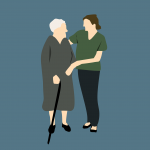Health Equity: What Does it Mean for Nursing?
 “Health disparities” refers to the inequalities in health and health care between different population groups. There are widespread inequalities that impinge upon public and individual health and well-being. Among the patients most directly affected are members of ethnic minorities, immigrant and low-income families, and people living in areas far from accessible care. According to a 2018 study, the United States spends an estimated $93 billion in excess medical costs per year due to racial disparities alone.
“Health disparities” refers to the inequalities in health and health care between different population groups. There are widespread inequalities that impinge upon public and individual health and well-being. Among the patients most directly affected are members of ethnic minorities, immigrant and low-income families, and people living in areas far from accessible care. According to a 2018 study, the United States spends an estimated $93 billion in excess medical costs per year due to racial disparities alone.
In recent years we have expanded our efforts to reduce health disparities to include an emphasis on achieving health equity. Healthy People 2020 defines health disparities as a type of particular difference in health status that is closely linked with economic, social, or environmental disadvantages. Populations that experience greater social and economic hardships are more likely to experience health disparities.
In contrast, health equity is a principle that underscores a commitment to reducing and ultimately eliminating health disparities.
Nurses must become skillful in advocating for social policies that can positively impact the myriad of social and economic conditions (inadequate housing, lack of employment and education opportunities) that adversely impact the health and well-being of those we serve.




